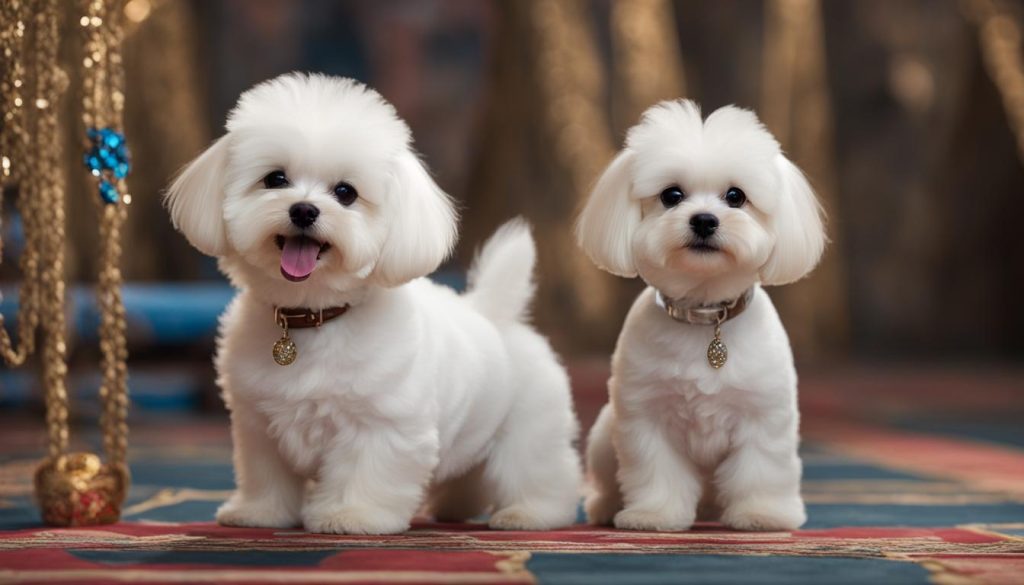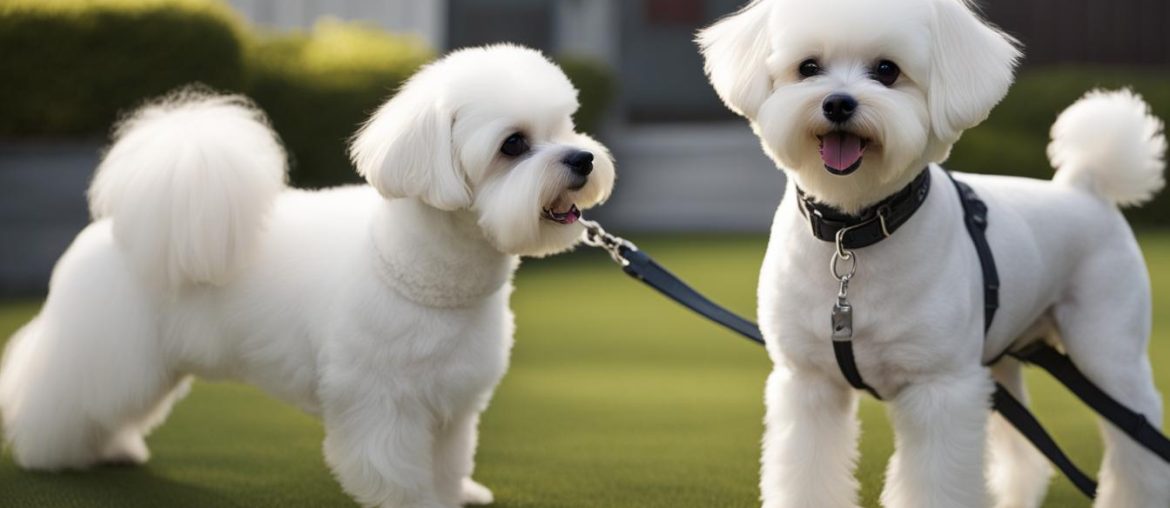If you’re looking to introduce a small white dog into your family, you may be considering either a Bichon Frise or a Maltese. Both breeds are similar in size and have hypoallergenic coats, making them suitable for people with dog allergies. However, there are important traits that set these two breeds apart. In this comprehensive comparison guide, we will explore the differences and similarities between Bichon Frise and Maltese, helping you decide which breed is better suited for your lifestyle and preferences.
Key Takeaways:
- Bichon Frise and Maltese are small white dog breeds with hypoallergenic coats.
- Both breeds have unique characteristics and traits that should be considered when choosing a dog.
- Size, temperament, grooming needs, and training requirements are important factors to consider.
- Bichon Frise and Maltese have different price ranges and shedding levels.
- The right breed for you depends on your lifestyle and ability to provide care and attention.
Bichon Frise or Maltese Comparison Chart
Here is a quick comparison chart highlighting the key characteristics of Bichon Frise and Maltese breeds, including their temperament, size, weight, price, hypoallergenic nature, lifespan, trainability, and shedding. This chart will serve as a useful reference point for understanding the main differences and similarities between these two breeds.
| Characteristic | Bichon Frise | Maltese |
|---|---|---|
| Temperament | Friendly, gentle, and playful | Affectionate, alert, and protective |
| Size | 9.5-11.5 inches | 7-9 inches |
| Weight | 12-18 pounds | 5-7 pounds |
| Price | $1,000 – $4,000 | $1,000 – $2,500 |
| Hypoallergenic | Yes | Yes |
| Lifespan | 12-15 years | 12-15 years |
| Trainability | Can be stubborn, but trainable with patience | Easy to train and enjoy learning new tricks |
| Shedding | Light shedding | Minimal shedding |
As seen in the comparison chart, Bichon Frise and Maltese have some distinct differences in their characteristics. Bichon Frise is known for its friendly and gentle temperament, while Maltese is more affectionate and protective. In terms of size, Bichon Frise is slightly larger, measuring 9.5-11.5 inches in height, compared to Maltese’s 7-9 inches. Bichon Frise also tends to weigh between 12-18 pounds, while Maltese weighs between 5-7 pounds.
When it comes to price, Bichon Frise puppies typically cost between $1,000 – $4,000, while Maltese puppies fall within the range of $1,000 – $2,500. Both breeds are hypoallergenic and have similar average lifespans of 12-15 years. Bichon Frise can be stubborn during training, requiring patience from the owner, while Maltese is generally easier to train and enjoys learning new tricks.
In terms of shedding, both breeds are considered to be low shedders, with Bichon Frise having slightly lighter shedding compared to Maltese. Regular grooming is important for both breeds to maintain their coat’s health and prevent matting.
Is the Bichon Frise for Me?
If you are considering getting a Bichon Frise, you should understand the breed’s characteristics and whether it is the right fit for your lifestyle. Bichon Frise dogs are small, hypoallergenic, and known for their playful and lively nature. They are suitable for small living spaces and can adapt well to living with other pets. However, their high-maintenance coat and stubborn streak should also be taken into consideration. You should provide them with proper exercise and mental stimulation to keep them happy and healthy.
Bichon Frise breed characteristics:
- Hypoallergenic coat
- Small size
- Playful and lively nature
- Suitable for small living spaces
- Potential for adaptability with other pets
- High-maintenance coat that requires regular grooming
- Can have a stubborn streak
- Requires proper exercise and mental stimulation for a happy and healthy life
“Bichon Frise dogs are small, hypoallergenic, and known for their playful and lively nature.”
When deciding if a Bichon Frise is the right dog for you, consider your lifestyle and ability to meet their grooming and exercise needs. Their small size and hypoallergenic coat make them a great choice for those with allergies or living in apartments. However, their high-maintenance coat requires regular brushing and grooming, which can be time-consuming and costly. Additionally, Bichon Frise dogs have a stubborn streak, so consistent training and mental stimulation are essential to keep them well-behaved and happy.

References:
- AKC – Bichon Frise Breed Information: https://www.akc.org/dog-breeds/bichon-frise/
- The Spruce Pets – Bichon Frise Breed Profile: https://www.thesprucepets.com/bichon-frise-dog-breed-profile-4783399
- Animal Planet – Bichon Frise: https://www.animalplanet.com/tv-shows/dogs-101/videos/bichon-frise
Is the Maltese for Me?
If you are considering getting a Maltese, you should understand the breed’s characteristics and whether it is the right fit for your lifestyle. Maltese dogs are known for their loyalty and affectionate nature, making them great companions for individuals or families. Their small size and hypoallergenic coat also make them suitable for those living in small spaces or with allergies.
However, consider some potential downsides of owning a Maltese. These dogs can be prone to separation anxiety, meaning they may become anxious or stressed when left alone for long periods of time. They thrive on human companionship and may require extra attention and mental stimulation to prevent boredom and destructive behaviors.
Additionally, the Maltese breed has a long and high-maintenance coat that requires regular grooming to keep it in good condition. This may involve daily brushing, regular baths, and occasional visits to a professional groomer. If you are not prepared to invest time and effort into grooming your dog, a Maltese may not be the best choice for you.

In summary, the Maltese breed offers many wonderful qualities such as loyalty, affection, and hypoallergenic coats. However, potential owners should be aware of their tendency towards separation anxiety and the grooming requirements of their long coats. Consider your lifestyle, time availability, and ability to provide the necessary care before deciding if the Maltese is the right breed for you.
Bichon Frise vs Maltese Size
When comparing the size of Bichon Frise and Maltese, it is clear that the Maltese is smaller. Bichon Frise can grow up to 9.5-11.5 inches in height and weigh between 12 and 18 pounds, while Maltese dogs usually reach 7-9 inches in height and weigh between 5 and 7 pounds.
For a visual representation of the size differences, refer to the table below:
| Breed | Height Range | Weight Range |
|---|---|---|
| Bichon Frise | 9.5-11.5 inches | 12-18 pounds |
| Maltese | 7-9 inches | 5-7 pounds |
As you can see, Bichon Frise dogs are slightly larger than Maltese dogs in terms of both height and weight. This can be an important consideration when choosing a breed, especially if you have limited living space or prefer a smaller dog.
It’s worth noting that these are general size ranges and individual dogs may vary. Always consider the specific measurements and characteristics of each dog you are considering to ensure the best fit for your lifestyle.
Bichon Frise vs Maltese Temperament
When it comes to the temperament of Bichon Frise and Maltese breeds, both are known for their friendly and affectionate nature. These small white dogs are lively, intelligent, and enjoy spending time with their owners. However, there are some differences in their temperaments that are worth considering.
Energy Level
The Bichon Frise tends to have a more playful and energetic nature. They love to run around, play fetch, and engage in interactive games. On the other hand, Maltese dogs are generally calmer and more relaxed. They enjoy cuddling and spending quiet time with their owners.
Alertness
Maltese dogs are known to be more alert and protective. They have a keen sense of hearing and will often bark to alert their owners of any potential intruders or unusual noises. Bichon Frise dogs, on the other hand, are usually less alert and more trusting of strangers.
| Bichon Frise | Maltese | |
|---|---|---|
| Energy Level | Energetic and playful | Calmer and relaxed |
| Alertness | Less alert and trusting of strangers | More alert and protective |
You should note that individual temperaments can vary within each breed, and proper socialization and training can greatly influence a dog’s behavior. Understanding the temperament of both breeds will help you make an informed decision about which breed is better suited to your lifestyle and preferences.

In the next section, we will explore the training differences between Bichon Frise and Maltese breeds, helping you understand their trainability and how to best train these intelligent dogs to be well-behaved companions.
Bichon Frise vs Maltese Training
When it comes to training, both the Bichon Frise and Maltese breeds are intelligent and can be successfully trained with patience and positive reinforcement. However, each breed has its own unique characteristics and tendencies that should be taken into consideration.
The Bichon Frise may have a stubborn streak, which can make training a bit more challenging. Consistency and positive rewards are key to successfully training a Bichon Frise. You should establish yourself as the leader and provide clear and consistent rules. Early socialization and obedience training are crucial for this breed to ensure they grow up to be well-behaved and obedient dogs.
The Maltese, on the other hand, is generally easier to train and enjoys learning new tricks. They are intelligent and eager to please, making them quick learners. Positive reinforcement methods, such as treats and praise, work well with the Maltese. Consistency in training and setting boundaries will help them become well-mannered dogs.
Regardless of the breed, you should start training as early as possible. Both the Bichon Frise and the Maltese benefit from early socialization with other dogs and exposure to different environments. Training sessions should be short, fun, and engaging to keep their attention. Patience, consistency, and positive reinforcement are the keys to successful training for both breeds.
| Training | Bichon Frise | Maltese |
|---|---|---|
| Trainability | Moderate | High |
| Stubbornness | Can be stubborn | Generally cooperative |
| Socialization | Important for proper behavior | Important for being well-mannered |
| Training Methods | Positive reinforcement | Positive reinforcement |
To put it simply, training is an ongoing process, and both breeds require consistent reinforcement of good behavior throughout their lives. I would recommend to create a bond based on trust and respect with your dog, as this will make training more enjoyable and effective for both of you.
Bichon Frise vs Maltese Price
When considering the price of a Bichon Frise or Maltese puppy, you should take into account various factors that can influence the cost. These factors include the lineage of the dog, the reputation of the breeder, geographic location, and demand for the breed in the market. On average, a Bichon Frise puppy can cost between $1,000 and $4,000, while a Maltese puppy may range between $1,000 and $2,500.
I would recommend to research and find a reputable breeder who prioritizes the health and well-being of their puppies. While it may be tempting to opt for a cheaper option, it is good practice to consider the potential long-term costs associated with a poorly bred or unhealthy dog. Investing in a well-bred, healthy puppy can save you money on veterinary bills and provide you with a companion who is more likely to have a longer and happier life.
Additionally, you should budget for the ongoing costs of owning a dog, regardless of the breed. These costs can include food, grooming, vaccinations, regular veterinary care, and potential unforeseen expenses. By considering the overall cost of ownership, you can make an informed decision that aligns with your financial capabilities and commitment to providing the best care for your new furry friend.
| Breed | Average Price Range |
|---|---|
| Bichon Frise | $1,000 – $4,000 |
| Maltese | $1,000 – $2,500 |

To put it simply, the cost of a puppy should not be the sole determining factor in your decision to bring a Bichon Frise or Maltese into your home. Consider factors such as temperament, grooming needs, size, and activity level to ensure the chosen breed aligns with your lifestyle and preferences. Whether you decide on a Bichon Frise or a Maltese, the love and companionship they provide are priceless.
Bichon Frise vs Maltese Shedding
When it comes to shedding, both the Bichon Frise and Maltese breeds are known for their minimal shedding and hypoallergenic qualities. The Maltese has a long, silky coat that sheds very little throughout the year, making it an excellent choice for individuals with allergies. The Bichon Frise, on the other hand, has a fluffy double coat that also sheds lightly. Regular grooming and brushing are essential for both breeds to maintain their coat’s health and prevent matting.
One of the key differences between the two breeds is the texture of their coats. The Maltese has a single-layered coat that grows continuously, similar to human hair, and requires regular maintenance to prevent tangles and matting. The Bichon Frise, on the other hand, has a thick, curly coat that needs frequent brushing to remove loose hairs and prevent tangling.
When it comes to grooming, both breeds require regular bathing, brushing, and trimming to keep their coats looking their best. The Bichon Frise may require more frequent grooming due to its thicker coat, while the Maltese may require more attention to prevent matting and tangling due to its longer coat. Regular visits to a professional groomer are recommended to ensure their coats are properly maintained.
In summary, both the Bichon Frise and Maltese are low-shedding breeds that are suitable for individuals with allergies. While the Maltese has a long, silky coat that sheds minimally, the Bichon Frise has a thick, curly coat that also sheds lightly. Regular grooming and grooming maintenance are essential for both breeds to keep their coats healthy and prevent matting and tangling.
Final Thoughts
After comparing the Bichon Frise and Maltese breeds, it is clear that both have their own unique qualities. If you are looking for a small, hypoallergenic companion, either breed can be a great choice. The decision ultimately comes down to your personal preferences and lifestyle.
The Bichon Frise is known for its playful and lively nature, making it a great fit for families and individuals who enjoy an active lifestyle. However, their high-maintenance coat requires regular grooming and attention. On the other hand, the Maltese is a loyal and affectionate breed that is well-suited for small living spaces. Their long, silky coat also requires regular grooming, but they are generally easier to train compared to the Bichon Frise.
Consider factors such as size, temperament, training requirements, and grooming needs when making your decision. Both breeds are intelligent and can be trained with patience and positive reinforcement. You should provide them with proper exercise and mental stimulation to keep them happy and healthy.
To sum it up, whether you choose a Bichon Frise or a Maltese, you can’t go wrong with either breed. They both make wonderful companions and are well-suited for individuals or families looking for a small, hypoallergenic dog. Take the time to research and interact with both breeds to see which one resonates with you the most. Ultimately, the right breed for you is the one that best matches your personality and lifestyle.
FAQ
What is the difference between Bichon Frise and Maltese?
Bichon Frise and Maltese are two different breeds with their own unique characteristics. While both breeds are small and hypoallergenic, Bichon Frise dogs are known for their playful and lively nature, while Maltese dogs are loyal and affectionate.
Are Bichon Frise and Maltese good for small living spaces?
Yes, both Bichon Frise and Maltese are well-suited for small living spaces. Their small size and adaptable nature make them suitable for apartment living.
Do Bichon Frise and Maltese get along well with other pets?
Yes, both Bichon Frise and Maltese can adapt well to living with other pets. However, proper introductions and socialization are important to ensure a harmonious coexistence.
Do Bichon Frise and Maltese have high-maintenance coats?
Yes, both Bichon Frise and Maltese have high-maintenance coats that require regular grooming. Bichon Frise dogs have a fluffy double coat, while Maltese dogs have a long and silky coat.
How much do Bichon Frise and Maltese puppies cost?
The price of a Bichon Frise or Maltese puppy can vary depending on factors such as lineage and location. On average, a Bichon Frise puppy can cost between $1,000 and $4,000, while a Maltese puppy may cost between $1,000 and $2,500.
Are Bichon Frise and Maltese hypoallergenic?
Yes, both Bichon Frise and Maltese are considered to be hypoallergenic breeds. Their minimal shedding and dander make them suitable for people with dog allergies.
Are Bichon Frise and Maltese easy to train?
Both Bichon Frise and Maltese are intelligent breeds that can be trained with patience and positive reinforcement. Bichon Frise dogs may have a stubborn streak, but with consistent training, they can learn new skills and good behavior.
How big do Bichon Frise and Maltese dogs get?
Bichon Frise dogs can grow up to 9.5-11.5 inches in height and weigh between 12 and 18 pounds, while Maltese dogs usually reach 7-9 inches in height and weigh between 5 and 7 pounds.
Do Bichon Frise and Maltese dogs have any health concerns?
Both Bichon Frise and Maltese breeds can be prone to certain health issues such as dental problems, eye infections, and patellar luxation. Regular veterinary check-ups and proper care can help prevent or manage these conditions.
Which breed is better suited for families with children?
Both Bichon Frise and Maltese can be good family dogs, but you should supervise interactions between small children and small dogs to prevent any accidental harm. Proper socialization and training from an early age are important for both breeds.






